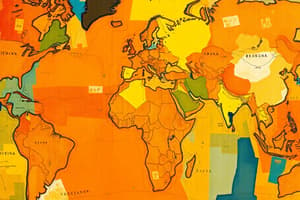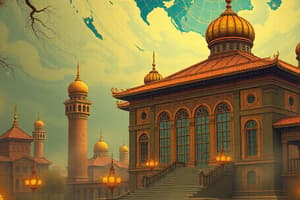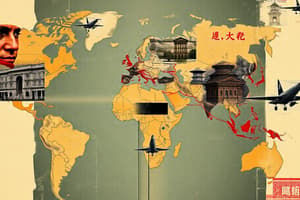Podcast
Questions and Answers
The General Agreement on Tariffs and Trade (GATT) was established in 1947 to increase trade restrictions between nations.
The General Agreement on Tariffs and Trade (GATT) was established in 1947 to increase trade restrictions between nations.
False (B)
Globalization was limited during the Cold War era due to peaceful relations between capitalist and communist states.
Globalization was limited during the Cold War era due to peaceful relations between capitalist and communist states.
False (B)
The liberalization era began in the 1990s and involved the gradual removal of trade barriers.
The liberalization era began in the 1990s and involved the gradual removal of trade barriers.
True (A)
The World Trade Organization (WTO) was established in 1947 to oversee trade agreements, negotiations, and dispute settlement.
The World Trade Organization (WTO) was established in 1947 to oversee trade agreements, negotiations, and dispute settlement.
Slowbalization refers to the period after the global financial crisis when globalization slowed down.
Slowbalization refers to the period after the global financial crisis when globalization slowed down.
Proponents of globalization argue that it has driven technological advancements but has led to rising inflation globally.
Proponents of globalization argue that it has driven technological advancements but has led to rising inflation globally.
During the Hellenistic Age, ancient Greece established trade, commerce, and cultural connections through the Silk Road.
During the Hellenistic Age, ancient Greece established trade, commerce, and cultural connections through the Silk Road.
The Silk Road was a series of interconnected trade routes that extended from the Far East to the Middle East and Europe.
The Silk Road was a series of interconnected trade routes that extended from the Far East to the Middle East and Europe.
The Age of Discovery started in the 18th century.
The Age of Discovery started in the 18th century.
European powers like Portugal, France, and Germany were pivotal in the exploration and colonization of new lands during the Age of Discovery.
European powers like Portugal, France, and Germany were pivotal in the exploration and colonization of new lands during the Age of Discovery.
The discoveries during the Age of Discovery led to the integration of the world through new scientific knowledge, inventions, and trade practices.
The discoveries during the Age of Discovery led to the integration of the world through new scientific knowledge, inventions, and trade practices.
Globalization has only been influenced by recent technological advancements.
Globalization has only been influenced by recent technological advancements.
Flashcards are hidden until you start studying
Study Notes
Globalization: An Everlasting Process
Introduction
Globalization, the economic, political, social, cultural, and technological exchanges among people, nations, and regions, has a rich history that dates back to ancient times. It has evolved from simple trade and cultural exchanges to the highly interconnected world we live in today, influenced by numerous historical events and technological advancements.
Ancient Times: Early Humans and the Silk Road
The earliest form of globalization can be traced back to ancient civilizations like Greece during the Hellenistic Age (323 to 100 BCE), when they established broad trade, commerce, and cultural connections. The Silk Road, a series of interconnected trade routes, emerged around 100 BCE, stretching from the Far East to the Middle East and Europe. Through these networks, goods, cultures, religions, technologies, and ideas were exchanged, contributing significantly to the development of globalization.
Age of Discovery: 15th Century to the Industrial Revolution
A pivotal period in globalization's history was the start of the Age of Discovery in the 15th century. The exploration and colonization of new lands, particularly by European powers like Portugal, Spain, the Netherlands, and England, expanded the scope of globalization. The discoveries enabled new scientific knowledge, inventions, and trade practices that further integrated the world.
Post World War II to Cold War Era
The post-World War II era saw an increase in globalization, driven by freer trade policies and international cooperation. The General Agreement on Tariffs and Trade (GATT), established in 1947, aimed to reduce tariffs and remove trade restrictions between nations, promoting economic integration. However, globalization was limited during the Cold War era due to political tensions between capitalist and communist states.
Liberalization Era: 1990s to Early 2000s
The liberalization era began in the 1990s, characterized by the gradual removal of trade barriers in large emerging market economies like China and unprecedented international economic cooperation. The World Trade Organization, established in 1995, became a multilateral overseer of trade agreements, negotiations, and dispute settlement. Cross-border capital flows surged, increasing the complexity and interconnectedness of the global financial system.
Slowbalization: Post Global Financial Crisis Era
After the global financial crisis, the pace of globalization slowed down, often referred to as "slowbalization." During this period, there were fewer trade reforms and weaker political support for open trade, leading to regionalization and even geoeconomic fragmentation.
In Defense of Globalization
Despite criticisms and challenges, proponents argue that globalization has driven disinflation and technological advancements, ultimately benefiting societies worldwide. They suggest that currently rising inflation could also lead to a renewed focus on globalization, rather than its abandonment.
In conclusion, globalization has a long and evolving history, shaped by numerous historical events and technological advancements. From its roots in ancient trade networks to the present day, globalization has transformed the way people, nations, and regions interact, and its impact will continue to shape our world in the future.
Studying That Suits You
Use AI to generate personalized quizzes and flashcards to suit your learning preferences.




